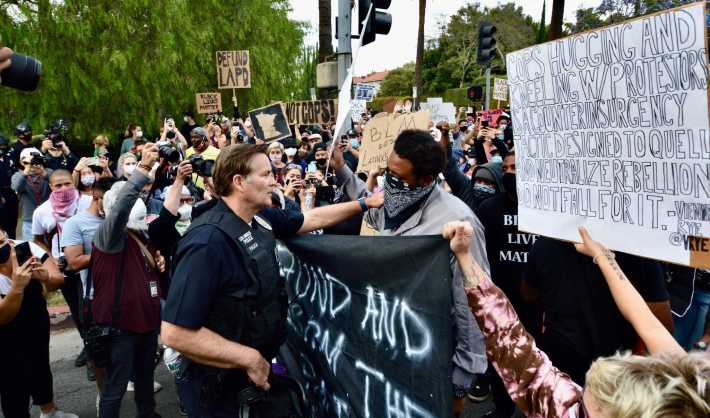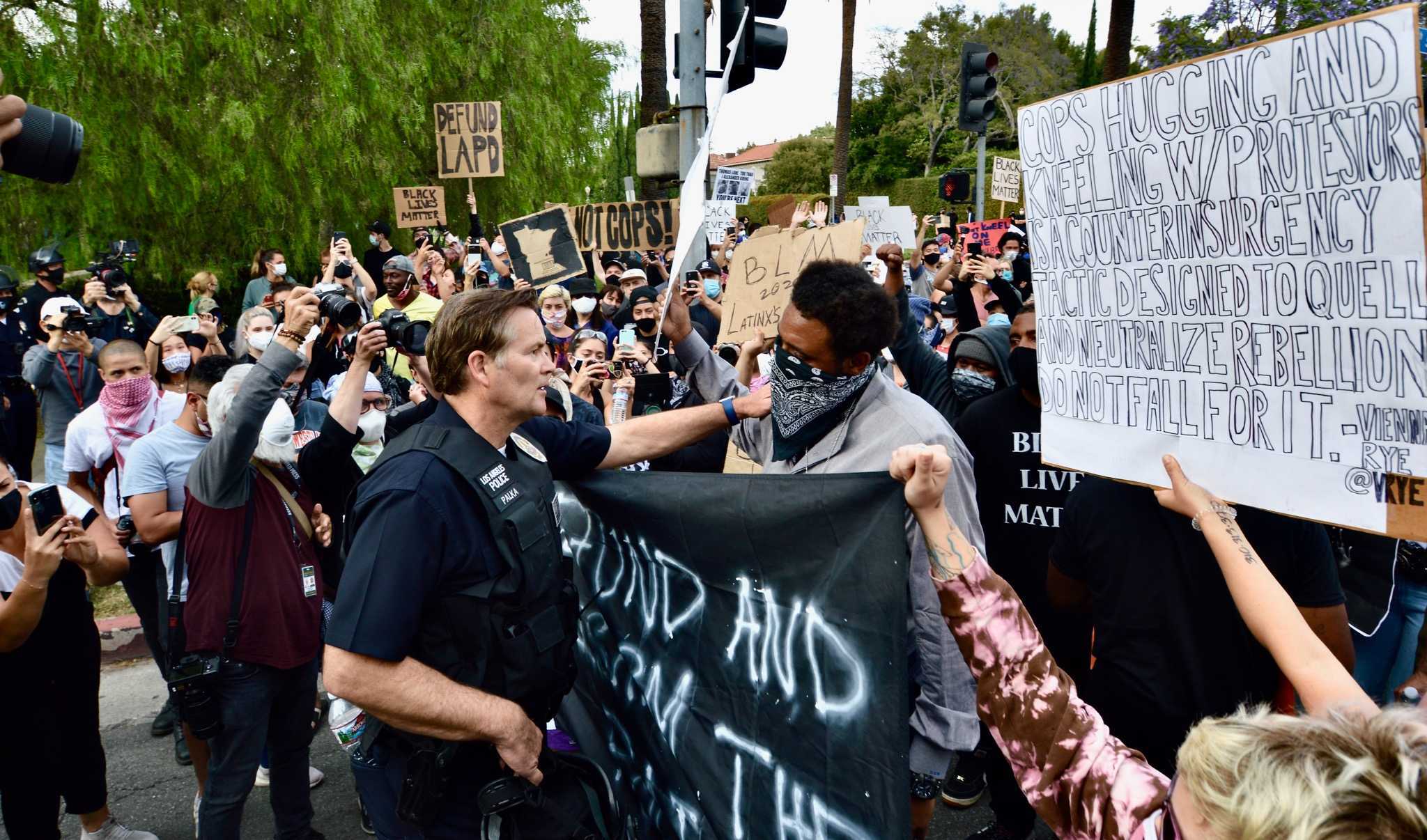[dropcap size=big]V[/dropcap]eteran assistant commanding officer Cory Palka did almost everything right last Tuesday when protestors surprised the Mayor and peacefully demonstrated outside of his mansion in Hancock Park.
Palka told L.A. Taco that he “redistributed officers” and removed their batons. He took a knee several times in solidarity with community members and at one moment had his officers back up 20 feet to give protestors more space. As if that wasn’t enough, he also directed a police helicopter to gain elevation during a speech going on so that the speaker can be heard loud and clear.
Then a video of him flashing the “OK” sign surfaced, a hand-gesture that has recently been associated with white power, after wrapping up an interview with a reporter. The interaction alarmed some folks on social media despite the fact that many people that are not associated with white supremacy use the hand gesture for other purposes, including people of color.
In reaction to the video, officer Palka told L.A. Taco, “I was waving goodbye to a videographer. I had NEVER been aware of that association to a hate group. NEVER. My assistant brought it to my attention after the Twitter alert.”
The controversy over the OK symbol is relatively new. White supremacists appropriated the hand gesture to be a symbol for White nationalism first reportedly as a joke. Last week, an NYPD officer was caught on video using the hand gesture and they’re currently under investigation by the attorney general. Polka is 56 years old and a 36-year veteran with the LAPD.
In the case of Palka though, this isn’t his first time being associated with White supremacy. In 2018, Hayes Davenport, co-host of the popular ‘L.A. Podcast’ revealed that assistant commander Palka was following people that are associated with White nationalism and racism on social media. The department has a policy against using social media to spread hate messages.
To that, Palka told L.A. Taco, “The accounts were followed as part of intelligence gathering related to potential protest activity at that time while I was the captain of LAPD Hollywood.”
2018 was the year that Los Angeles saw the proliferation of hate groups associated with White power and misogyny in Los Angeles, such as when the Proud Boys held a public meeting at the Chinatown location of Highland Park Brewery in Chinatown and at a bar in Atwater Village.
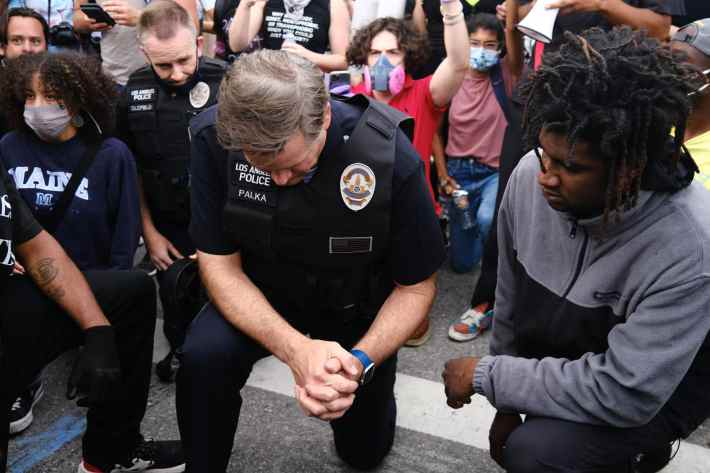
Palka was with the Hollywood division of the LAPD at a time when entertainment venues that catered to the Black community and POC were being targeted with nuisance complaints and other citations, according to public records obtained by citizen journalist, Adrian Riskin. Riskin compares the gentrification of Hollywood over the past decade to the gang injunctions that were used to evict Black and brown people from Venice and Echo Park, paving the way for wealthy Whites to take over.
“If you look at ALL the followers I have and break them apart, you will see I follow a balanced group, mostly to gather information for activities related to policing in L.A.” Palka said in response to allegations of following white supremacists.
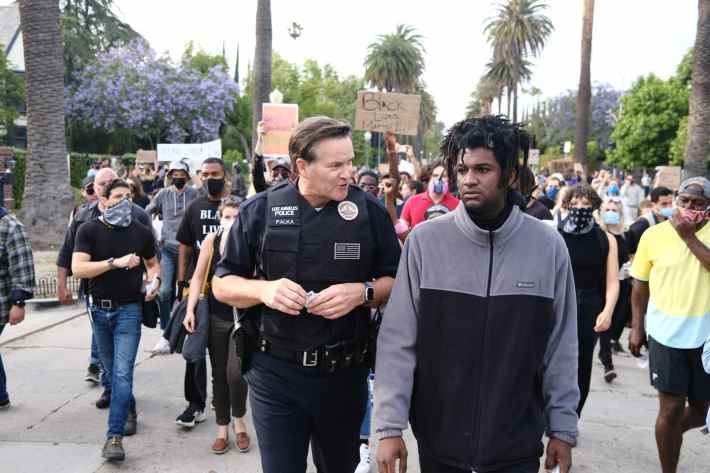
In 2016 Palka gave public comment at the Planning and Land Use Management committee, urging the group headed at the time by Councilmember Jose Huizar, to reject an appeal made by the Cosmo Club challenging the revocation of their conditional use permit.
“We need business partners who will meet with us, who will greet us, and who will listen to what we know as being true to operate successfully [as] a business and an entertainment venue. This client, the Cosmo, has not done that. I can show you repeated violent crime in and around that neighborhood. [Unintelligible] I need to continue that kind of growth in Hollywood with good partners and good investors, and the Cosmo just has not been one of them.”
Palka’s problematic hand gesture captured on live television and his NYC counterpart who was dragged through social media for it, whether accidental or not, shows that being unaware about such matters is no longer a legitimate excuse in a post-George Floyd world.
Assistant commander Palka pointed to police data as the reasoning behind shutting down nightclubs in Hollywood and offered to let L.A. Taco review the files at a later date.
In a 2018 L.A. Times op-ed written by Michael Krikorian, an author and husband of Chef Nancy Silverton, Palka told Krikorian, “We closed three clubs in Hollywood that were a magnet for the urban crowd of South L.A.” to which Krikorian responds with, "It doesn’t take a sociologist to figure out “urban” means black." Krikorian and Silverton were recently criticized for writing a controversial op-ed about protesting during the pandemic.
In the op-ed Palka elaborates, “Of course, the vast majority are good people. But with an urban crowd from South L.A., you are going to have some gang members. That’s just the facts. And you have club owners with an encouraging attitude — over-serving alcohol, not having proper security — that fuels the situation. Throw in gang members from different neighborhoods, and you get killings.”
Predictive policing programs or data-driven policing models are controversial at best. In 2019, Chief Moore ended Operation LASER, a data-driven policing program that organizers accused of unfairly targeting Black and Latino communities in South L.A. and Downtown.
“This is not just an isolated incident, these are programmatic operations,” organizer Hamid Khan with Stop LAPD Spying told L.A. Taco when speaking about predictive policing in the Downtown area. “What we saw was that in the central division of the LAPD is they had basically just created these hotspots, which became a periphery or digital redlining around Skid Row to protect the downtown expansion.”
Polka’s efforts that showed empathy towards the thousands of protestors demanding the defunding of the police undoubtedly speaks volumes in the same week that has seen police in other parts of the country shove a 75-year-old man and leave him lifeless and bloodied on the floor.
“For years, Los Angeles officials have spent more money on police at the expense of communities. Investments in communities is what drives public safety. Well-resourced communities are safer communities.” Black Lives Matter-LA outlines in the People’s Budget, a revised version of the Mayor’s budget that takes resources away from the police and redistributes them to areas that are important to the community. Policing costs 3.1 billion a year when taking into consideration pensions, health care, workers comp and other costs, the people’s fund would reduce their budget to less than 10 percent.
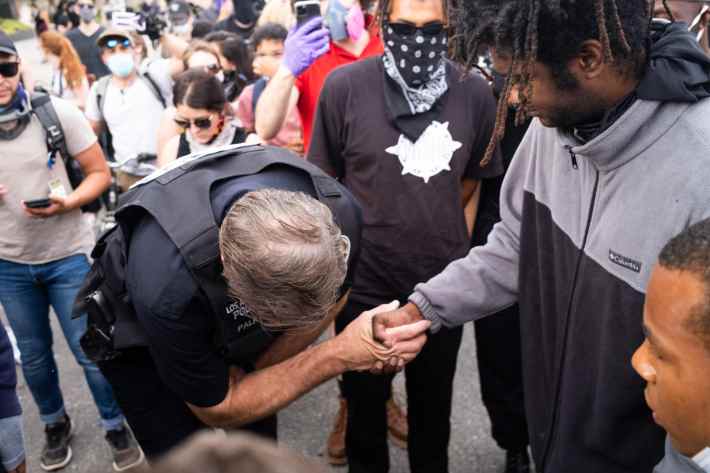
Over the past 10 days, tens of thousands of Angelenos have been protesting across the city, day and night for various reasons. But for Black Lives Matter L.A. they’re message is simple, “Defund the police.” The group believes that the best way to change policing is to take away their money. Unprecedented moments like this often remind us of the larger systemic injustices within our society. The pandemic for instance highlighted problems with our response to homelessness, our criminal justice institutions and immigration laws. Problems that community members have been highlighting for decades.
“Cops hugging and kneeling w/ protestors is a counterinsurgency tactic designed to quell and neutralize rebellion, do not fall for it.”
"White guilt doesn't solve the problems,” Kenton, a 26-year-old runway model and Black man that splits his time between New York City and Los Angeles told L.A. Taco in Hollywood Thursday, a day after he was violently arrested for breaking curfew. “What are all these people going to do when this is over, what are they going to do when they see another Black man getting arrested."
L.A. Taco contributing photographer Brian Feinzimer documented Kenton kneeling with Palka just hours before getting arrested on Tuesday after the initial protest at the Mayor’s house spread to 8th Street and Crenshaw Boulevard.
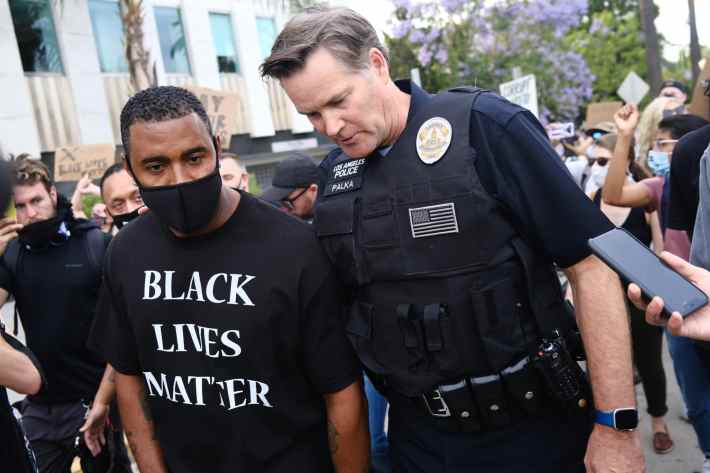
Palka’s problematic hand gesture captured on live television and his NYC counterpart who was dragged through social media for it, whether accidental or not, shows that being unaware about such matters is no longer a legitimate excuse in a post-George Floyd world. Polka’s efforts that showed empathy towards the thousands of protestors demanding the defunding of the police undoubtedly speaks volumes in the same week that has seen police in other parts of the country shove a 75-year-old man and leave him lifeless and bloodied on the floor.
After commander Palka asked his officers to move back 20 feet to give protestors more room towards the end of Tuesday’s protest at the Mayor’s house, he had a moment of embrace with a protestor who was also a war veteran. The scene, photographed perfectly by L.A. Taco’s Director of Partnerships Memo Torres, was emblematic of the day. At the same time, adjacent to Palka and the war veteran, a protestor held up a sign that read, “Cops hugging and kneeling w/ protestors is a counterinsurgency tactic designed to quell and neutralize rebellion, do not fall for it.”
